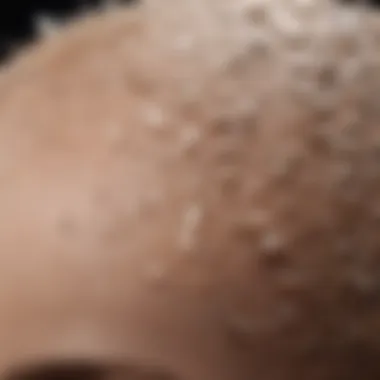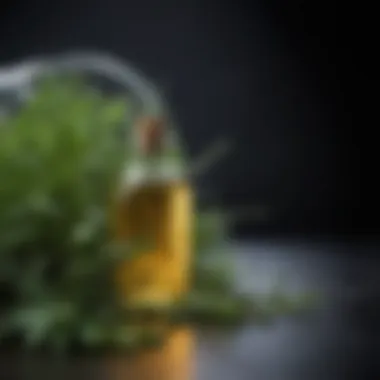Best Remedies for Dry Flaky Scalp: Solutions & Tips


Intro
Dealing with a dry, flaky scalp can be an uncomfortable experience. This issue affects many individuals, leading to embarrassment and frustration. Understanding the underlying causes is essential for developing effective remedies. Dry scalps can occur due to a variety of factors, including environmental conditions, dietary habits, and even hair care practices.
In this article, we will explore both natural and commercial remedies for treating this condition. Additionally, we will highlight preventive measures that can help maintain a healthy scalp. By the end, readers will have a comprehensive understanding of how to combat dryness and keep their scalp nourished.
Key Trends
Overview of Current Trends
Recent surveys indicate that there is a rising awareness regarding scalp health. Products that focus on both hair and scalp care are becoming more common in the beauty marketplace. Consumers are seeking formulations that not only improve hair appearance but also address the health of the scalp underneath.
Popular Remedies
Among the most sought-after remedies are those that feature natural ingredients. Many individuals prefer essential oils like tea tree, coconut oil, and aloe vera. These ingredients have proven beneficial properties that can soothe and hydrate the scalp.
"Embracing natural remedies can often lead to better scalp health and fewer side effects compared to chemicals."
In addition, specialized treatments, like medicated shampoos, are gaining popularity. These products often contain active ingredients that target the causes of dryness. Popular brands are responding with better formulations to meet this demand.
Understanding the Causes
A dry scalp can stem from numerous sources:
- Weather conditions: Cold air and excessive heat can strip moisture from the scalp.
- Product buildup: Using too many products can lead to residue, affecting scalp health.
- Dietary deficiencies: Lack of essential fatty acids and vitamins can play a significant role in scalp hydration.
Recognizing these catalysts is essential for selecting the right remedy.
Home Remedies
Natural Treatments
Many individuals turn to home remedies to alleviate dry, flaky scalp. These include:
- Coconut Oil: Known for its moisturizing properties, coconut oil can be applied directly to the scalp.
- Aloe Vera: This natural remedy is famous for its soothing abilities. Applying aloe directly can provide instant relief.
- Honey and Olive Oil Mask: Mixing honey with olive oil creates a nourishing mask that hydrates the scalp.
Essential Oils
Integrating essential oils can enhance any regimen. Popular options include:
- Tea Tree Oil: It contains antifungal properties that may help combat dandruff.
- Lavender Oil: Known for its calming fragrance, it also promotes scalp health.
These remedies offer affordable and effective solutions for many people.
Professional Treatments
For those seeking immediate results or suffering from chronic conditions, professional treatments may be necessary. Options include:
- Dermatological Consultations: A specialist can diagnose the underlying causes of scalp dryness.
- Medicated Shampoos: Shampoos like Nizoral or Head & Shoulders can provide relief from irritation and dryness.
Preventive Measures
After identifying effective remedies, it is paramount to integrate preventive measures into one's routine. These include:
- Hydrating Regularly: Drink enough water daily to maintain overall body hydration.
- Avoiding Harsh Chemicals: Be mindful of the products used; opt for sulfate-free and gentle formulations.
- Regular Exfoliation: Mild scalp scrubs can help remove buildup and promote healthier skin underneath.
Implementing these practices can significantly improve scalp health over time.
Understanding Dry Flaky Scalp
Dry flaky scalp is a common issue that many individuals face. Understanding this topic is crucial to finding appropriate treatments. It can impact one’s comfort and self-esteem. The condition may result in itchiness or irritation that becomes highly bothersome. By addressing it thoroughly, individuals can enhance the overall health of their scalp and hair.
What Constitutes a Dry Flaky Scalp


A dry flaky scalp is characterized by the shedding of skin flakes along with symptoms such as redness and irritation. It can occur from various factors, including environmental changes and certain skin conditions. Distinguishing between normal dryness and severe scalp issues is essential for effective treatment. Individuals need to self-assess to determine the severity of their symptoms.
Common Symptoms and Signs
Recognizing the symptoms is the first step towards managing a dry flaky scalp. Here are several indicators:
- Flakes: Noticeable skin flakes falling onto clothing or shoulders.
- Itching: Persistent itchiness can signal dryness.
- Redness: Inflammation and redness around the scalp area.
- Tightness: Sensation of tightness in the scalp often accompanies dryness.
Potential Causes
Understanding the underlying causes helps in addressing the issue effectively. Several factors contribute to a dry flaky scalp.
Skin Conditions
Skin conditions such as psoriasis and eczema are significant contributors to dry flaky scalp. They lead to inflammation and result in the shedding of skin cells. These conditions often require specific treatments to manage symptoms effectively. Psoriasis, for instance, leads to red patches and silvery scales. Its chronic nature means it needs long-term management strategies.
Environmental Factors
Environmental factors play a crucial role in scalp health. Variables like cold weather, dry heat from indoor heating, and exposure to sun can exacerbate dryness. Low humidity levels typically lead to lower moisture content in the air, affecting the scalp. Protection against harsh elements becomes necessary, particularly during the winter months.
Dietary Influences
Dietary influences can significantly impact scalp health. Lack of essential nutrients may cause skin issues. A diet deficient in vitamins and minerals can weaken the skin barrier. Essential fatty acids, particularly Omega-3, help maintain skin hydration. This highlights the need for a balanced diet rich in nutrients for healthy scalp.
Product Reactions
Product reactions are another potential cause of a dry flaky scalp. Many people use hair products without fully understanding their ingredients. Certain shampoos and conditioners may contain harsh chemicals that strip natural oils from the scalp. Awareness of which products to avoid is important for maintaining scalp health. Always perform a patch test before trying new products.
Home Remedies for Dry Flaky Scalp
Home remedies for dry flaky scalp offer an accessible and often effective way to address scalp issues without the need for costly treatments or products. Many individuals find relief using natural solutions that can be easily obtained from local markets or even from their kitchens. This section discusses various remedies, emphasizing their benefits and considerations for those seeking alternative methods to achieve a healthier scalp.
Natural Oils
Natural oils have been widely recognized for their ability to hydrate and nourish the scalp. They create a protective barrier, locking in moisture and preventing dryness. This makes them an essential part of home remedies.
Coconut Oil
Coconut oil is a popular choice due to its high content of medium-chain fatty acids. These fatty acids penetrate the hair shaft and scalp easily, providing deep hydration. A key characteristic of coconut oil is its antimicrobial properties. This can help reduce dandruff caused by fungal infections.
Unique feature: Coconut oil effectively soothes inflammation and irritation of the scalp. However, some people might experience clogged pores if they use too much, leading to potential buildup.
Argan Oil
Argan oil is often referred as "liquid gold". It is rich in vitamin E and essential fatty acids, which are crucial for maintaining scalp health. The oil's lightweight texture allows for easy application without leaving an overly greasy residue.
Unique feature: Its antioxidant properties help protect the scalp from environmental damage. Some individuals may find it slightly expensive compared to other oils, but its benefits often justify the cost.
Jojoba Oil
Jojoba oil closely resembles sebum produced by our skin, making it a suitable option for those with sensitive scalps. It provides moisture to the scalp while balancing oil levels, making it effective for both dry and oily scalps.
Unique feature: As a natural emulsifier, jojoba oil helps to cleanse the scalp of excessive wax and buildup. Its gentle formula makes it an excellent choice for users with sensitive skin.
Aloe Vera Applications
Aloe vera is renowned for its soothing properties. When applied to the scalp, aloe vera gel can reduce itching and flakiness. Its natural hydrating abilities help to moisturize the skin while promoting healing. Aloe vera is also known to contain vitamins and enzymes that nourish the scalp, supporting overall hair health.
Herbal Infusions
Herbal infusions derived from various plants can also greatly benefit a dry flaky scalp. These infusions are typically rich in antioxidants and anti-inflammatory properties.
Rosemary
Rosemary has stimulating properties that improve blood circulation in the scalp. This helps to nourish the hair follicles. Its key characteristic is its ability to promote hair growth while also combating dryness. Rosemary's unique feature lies in its potential to enhance overall scalp health. However, strong application may lead to irritation for some users.


Chamomile
Chamomile is often used for its calming effects. The plant contains anti-inflammatory agents that help to soothe irritated scalps. Its key characteristic is its gentle nature, making it suitable for sensitive skin. One of its unique features includes its lightening effect on hair, which may be advantages depending on personal preference. Some individuals, however, may experience allergic reactions.
Lavender
Lavender is well-known for its aromatic qualities and calming effects. When used on the scalp, lavender oil can alleviate dryness and promote relaxation. It is a beneficial choice for those dealing with stress-related scalp issues. Lavender has unique antimicrobial properties that can prevent bacterial infections. Nevertheless, some might find its strong fragrance overpowering.
Oatmeal Masks
Oatmeal masks are a simple yet effective remedy for dry flaky scalp. They help to soothe itchiness and provide hydration. Oatmeal is known for its anti-inflammatory properties, which can calm irritation and redness. It is also gentle enough for all skin types, making it a universally favorable option. Regular use of oatmeal masks can lead to improved scalp texture and a decrease in flakiness, promoting healthier hair growth.
Commercial Products for Scalp Care
Commercial products for scalp care play a crucial role in addressing dry, flaky scalp. In many cases, these products are formulated with specific ingredients that target the common causes of scalp issues, such as dryness, irritation, and inflammation. Choosing the right product can lead to improved hair health and overall scalp condition. Considerations include the ingredients used, skin sensitivities, and your individual hair type. Also, it's vital to integrate these products into a comprehensive skincare routine that includes home remedies and lifestyle adjustments.
Moisturizing Shampoos
Moisturizing shampoos are specifically designed to hydrate the scalp and make hair feel more manageable. Ingredients like glycerin, aloe vera, and natural oils are commonly included in these formulations. These components help to replenish lost moisture, which is especially beneficial for those with dry, flaky scalp. Look for shampoos that are sulfate-free as sulfates can strip natural oils from the scalp and exacerbate dryness. It is important to note that while moisturizing shampoos provide benefits, they should be used correctly. Avoid washing your hair too frequently, as this can lead to further drying.
Scalp Conditioners
Scalp conditioners complement moisturizing shampoos by providing additional hydration and soothing properties. They often contain nourishing ingredients such as jojoba oil, shea butter, and tea tree oil, which can help reduce irritation and promote a healthier scalp environment. Regular use of scalp conditioners can enhance moisture retention, making hair shinier and easier to style. Apply these conditioners directly to the scalp, massaging gently to increase circulation and enhance absorption. They serve as an essential step in any scalp care regimen.
Exfoliating Treatments
Exfoliating treatments are less common but equally significant for maintaining scalp health. They help remove dead skin cells and build-up from hair products that can weigh hair down. Ingredients like salicylic acid or exfoliating scrubs made from natural ingredients can encourage cell turnover without causing irritation. These treatments should be used sparingly, as over-exfoliation might lead to sensitivity. Incorporating exfoliating treatments into your routine once a month can promote a healthier scalp, contributing to better hair growth and a balanced scalp environment.
Regular use of suitable commercial products is essential for effective scalp care. Not just for cosmetic reasons, a healthy scalp is fundamental for overall hair health.
Diet and Hydration
Diet and hydration play crucial roles in maintaining scalp health. A well-balanced diet not only benefits the overall health of the body but also contributes to scalp hydration and the management of dryness. Nutritional intake affects skin and scalp conditions, especially when it comes to moisture retention. Thus, focusing on diet and proper hydration can significantly mitigate dry, flaky scalp issues.
Importance of Hydration
Hydration is fundamental for skin health, including the scalp. When the body is adequately hydrated, it can support skin elasticity and minimize dryness. The scalp often reflects the overall hydration levels in the body. Insufficient fluid intake can lead to a dry, itchy scalp, exacerbating flakiness and irritation.
Drinking enough water helps maintain healthy skin barriers, promoting better moisture retention. Therefore, consuming the recommended daily amount of liquids is essential. This typically means drinking around eight glasses, but individual needs can vary based on factors like activity level and climate.
Nutritional Deficiencies
Vitamins and Minerals
Vitamins and minerals are vital for maintaining overall health, including the condition of the scalp. Vitamin A, for example, is known for its role in skin cell production and repair. Without enough vitamin A, the scalp can become dry and prone to irritation. Biotin, another important vitamin, contributes to the strength and elasticity of hair, supporting scalp health indirectly.
Many vitamins act as antioxidants, protecting the skin from oxidative stress. Not only are these vitamins beneficial, but they are also easily incorporated into meals through fruits, vegetables, and other food sources.
Essential Fatty Acids
Essential fatty acids, particularly Omega-3 and Omega-6, are critical to maintaining healthy skin, including the scalp. They aid in reducing inflammation and support the skin’s lipid barrier, which helps to lock in moisture. An adequate intake of these fatty acids can diminish dryness and scaling on the scalp.
Moreover, fatty acids enhance blood circulation to the scalp, ensuring better nutrient delivery, which may promote healthy hair growth. Foods like fish, nuts, and seeds are excellent sources, making it manageable to integrate them into daily diets.
Dietary Recommendations
Foods Rich in Omega-3
Including foods rich in Omega-3 can be particularly beneficial for scalp health. These include fatty fish such as salmon, walnuts, and flaxseeds. Omega-3 fatty acids are favored for their anti-inflammatory properties. They help combat irritation often associated with dry scalps. Moreover, they directly promote scalp moisture, making them a vital addition to one's diet.
Fruits and Vegetables
Fruits and vegetables are not just crucial for overall health; they also provide necessary hydration and nutrients for the scalp. They are rich in vitamins, minerals, and antioxidants. Berries, for instance, are high in Vitamin C, supporting collagen production, which is key for skin elasticity and health. Leafy greens like spinach are loaded with iron and magnesium, essential for scalp blood circulation.
Integrating a variety of colors in fruits and vegetables ensures a wide range of nutrients that can help maintain a healthy scalp.


Proper hydration and a balanced diet are crucial for managing a dry, flaky scalp.
Lifestyle Factors and Scalp Health
Understanding the connection between lifestyle factors and scalp health is vital for addressing issues such as a dry, flaky scalp. These factors can significantly affect the scalp's condition, contributing either positively or negatively to its overall health. As our daily lives become increasingly busy, we might overlook how certain habits impact our hair and scalp. This section focuses on vital elements such as stress management, preventive care practices, and the frequency of hair washing. Each aspect plays a role in maintaining a healthy scalp and, consequently, healthy hair.
Stress Management Techniques
Stress is a common issue that can lead to a variety of health problems, including a dry flaky scalp. When individuals experience stress, the body's hormonal balance can be disrupted, leading to increased oil production or dryness in the scalp. Understanding stress management techniques can help alleviate these symptoms.
Here are some effective stress management strategies:
- Mindfulness and Meditation: Practicing mindfulness can help reduce stress levels. Simple exercises like focusing on your breath can lead to a calmer mind.
- Physical Activity: Engaging in regular exercise can boost mood and overall well-being. Aim for at least 30 minutes of moderate activity most days of the week.
- Adequate Sleep: Quality sleep is essential for the body's recovery and can significantly affect stress levels. Aim for 7 to 9 hours a night to help manage stress.
- Social Support: Connecting with friends and family can provide emotional support, reducing feelings of stress and anxiety.
Implementing these techniques may contribute to a healthier scalp by minimizing the impact of stress on the body's balance.
Preventive Hair Care Practices
Preventive hair care practices are fundamental to maintaining scalp health. Taking proactive steps can help fend off dryness and irritation before they become significant issues. Here's how to do it:
- Choose the Right Products: Selecting sulfate-free and alcohol-free shampoos can prevent stripping moisture from your scalp. Look for ingredients that hydrate and nourish.
- Avoid Over-Styling: Limit the use of heat styling tools, as excessive heat can damage hair and dry out the scalp. When using heat, opt for a heat protectant spray.
- Regular Scalp Massages: Massaging the scalp can increase blood circulation, promoting healthier hair follicles and scalp hydration. Use gentle circular motions for best results.
- Protect from Environmental Factors: Wear hats or scarves in harsh weather conditions to protect the scalp from wind and sun damage.
Implementing these practices can create a healthier environment for your scalp and hair.
Hair Washing Frequency
Finding the right hair washing frequency is essential for maintaining scalp health. While it may vary from person to person, washing too frequently or infrequently can lead to problems.
- Over-Washing: Washing hair daily can strip natural oils from the scalp, leading to dryness and irritation. If your scalp feels dry or flaky, consider extending the washing interval.
- Under-Washing: On the contrary, not washing enough can lead to the buildup of sweat, oils, and products, potentially causing clogged follicles and dandruff.
A balanced approach is often key. Many dermatologists recommend washing every 2 to 3 days for most hair types. Pay attention to how your scalp responds to determine what works best for you.
When to Seek Professional Help
Understanding when to seek medical advice for a dry flaky scalp is essential for effective treatment. This condition can lead to discomfort and social embarrassment. When over-the-counter remedies fail to improve the situation, or if the issue worsens, consulting a dermatologist becomes necessary. A professional evaluation can help identify any underlying health conditions contributing to the issue, ensuring appropriate treatment pathways are explored.
Moreover, seeing a specialist can save time and prevent the exacerbation of symptoms. They can offer tailored advice based on individual scalp conditions, thus streamlining the treatment process.
Indications for Medical Consultation
Not every case of dry flaky scalp requires professional intervention. However, several signs can indicate the need for a dermatology appointment:
- Persistent Symptoms: If dry patches and flakes continue despite home treatments or commercial products.
- Severe Itching: Accompanied by redness or swelling, requiring immediate attention.
- Hair Loss: Notable thinning or bald patches which may signal a more serious condition.
- Discoloration or Unusual Growths: Any change in skin color or texture should be evaluated.
- Accompanying Symptoms: Conditions such as psoriasis or eczema affecting other areas of the body.
If these symptoms present, pursuing professional help can be beneficial. By diagnosing the root cause, dermatologists can recommend effective treatment plans.
Treatment Options from Dermatologists
Dermatologists have various treatment modalities to handle dry flaky scalp effectively:
- Prescription Medications: Topical steroids or antifungal treatments that target specific conditions like seborrheic dermatitis or fungal infections.
- Interventional Therapies: Light therapy or chemical treatments that can reduce inflammation and promote healthy skin regeneration.
- Customized Scalp Treatments: These may include medicated shampoos containing ingredients like ketoconazole or salicylic acid.
- Education on Scalp Care: Specialists often provide guidance on proper hair care habits, recommending suitable products based on individual scalp needs.
In summary, knowing when to seek professional help not only improves scalp health but also enhances overall well-being.
Closure
The conclusion of this article is essential as it encapsulates the various strategies and insights related to dry flaky scalp. This topic addresses a common problem faced by many, offering a variety of solutions that can significantly enhance scalp health. By understanding the multifaceted nature of this issue, readers can not only identify potential causes but also adopt practical remedies.
Summary of Key Insights
In summary, the key insights from this piece highlight the multiple approaches to managing a dry flaky scalp. Here are some of the primary points:
- Understanding Causes: Identifying underlying factors such as skin conditions, environmental influences, and dietary deficiencies is crucial.
- Home Remedies: Natural oils like coconut oil and aloe vera stand out for their moisturizing properties while being easily accessible.
- Professional Treatments: Knowing when to consult a dermatologist can lead to tailored treatment options that go beyond over-the-counter solutions.
- Lifestyle Factors: Stress management and proper hair care techniques are also significant contributors to maintaining a healthy scalp.
This comprehensive overview encourages readers to explore both home and commercial remedies while keeping in mind the importance of lifestyle choices.
Final Thoughts on Scalp Care
Final advice on scalp care emphasizes a holistic approach. Integrating good hydration and nutrition with regular scalp care practices fosters a better environment for hair health.
- Regular Moisturization: Whether using commercial products or home remedies, consistent moisturizing is vital.
- Dietary Additions: Incorporating foods rich in omega-3 fatty acids can support scalp health significantly.
- Awareness of Changes: Pay attention to the scalp's response to various treatments and adapt accordingly.



